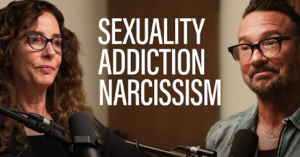Porn addiction, internet sex or cyber sex addiction are becoming increasingly prevalent. Not everyone who looks at pornography on the internet has a porn addiction. There is a large number of people who find they cannot stop watching porn even though the want to. Online porn addiction can affect a person’s work, family, and ability to date or form intimate relationships. Hours on the internet can pass before the addict realizes they have neglected their commitments. The internet has increased access to new sexual avenues and anonymous hookup sites. The wide availability of sex can be a problem for people who feel controlled by their sexual impulses.
What is Porn Addiction?
Porn addiction is defined as the overuse of pornography in a way that has negative consequences. A porn addict feels powerless to stop watching porn even though they want to stop. The porn addict may find that they are unable to control their internet use despite negative consequences. Pornography addiction is often isolating and consuming. Many porn addicts report that hours can pass before they realize how much time they have spent watching porn. Porn addiction can be time consuming. Porn addiction takes away from the time a person might normally spend with their family, friends, or working. When a person watches too much pornography, emotional and sexual intimacy with a real live person can be overwhelming. A fear of intimacy may reinforce the cycle of porn addiction. It is easier to turn a video on or off than to relate to a real person.
Internet Sex and Porn Addiction
Internet sex and porn addiction tend to happen concurrently. Internet sex, also called cyber sex, can happen via chat rooms, email, news groups, social media sites, pornographic websites, or smartphone applications. According to the Society for the Advancement of Sexual Health, approximately two million people are addicted to internet sex. Part of the appeal of internet sex is the lack of intimacy, as well as the freedom to create whatever persona the user wants. Fantasies are easily fulfilled via internet sex, but come at a high cost. Family, friends, or work relationships are compromised by the addict’s obsession with internet sex. Internet porn can be the beginning of a slippery slope that leads to potentially dangerous or compromising situations. Anonymous sex may follow porn addiction when the “high” no longer fills the intended void.
Pornography addiction often goes hand-in-hand with compulsive masturbation. Compulsive masturbation with or without pornography and compulsive viewing of porn with or without masturbation can be isolating and time consuming. Sex addicts can lose hours daily to the isolating activities of fantasy and masturbation. Cyber sex, phone sex lines, videos, porn magazines, or obsessive fantasies are all ways people lose touch with their priorities. People who struggle with these behaviors report feeling a loss of control, a preoccupation or obsession with pornography or masturbation, and will continue with the behavior despite negative life consequences.
Working with a sex addiction therapist is essential to overcoming porn addiction, cyber sex addiction, or masturbation addiction. A trained sex addiction therapist can help clients deal with their feelings of shame and embarrassment. A qualified professional can provide interventions to stop the problem behaviors.
Porn Addiction Treatment
At CHS, we offer therapy and support for porn addicts in a variety of formats. Our specialists are here to provide compassionate support to help rebuild lives.
Treatment options for Porn Addicts include:
- INDIVIDUAL PORN ADDICTION THERAPY
- COUPLES PORN ADDICTION THERAPY
- GROUP THERAPY FOR PORN ADDICTION
- SEX/PORN ADDICTION ONLINE COACHING
Individuals concerned with porn addiction or internet compulsivity can take the Internet Sex Addiction Screening Test.
To learn more about our porn addiction treatment options or to schedule an appointment at CHS, please call our Intake Counselors at (310) 843-9902.
Porn addiction can create deep feelings of shame and hopelessness. Obtaining support as a porn addict is crucial for maintaining your sanity and self-worth.
You may have pressing questions like “What should I do next?” and “How do I begin to alter my behavior?” Some people simply find deep healing in knowing that they are not alone, and that others have been in their shoes and had similar experiences.



